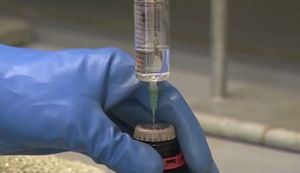Titanium(IV) chloride
 TiCl4 drawn out using a syringe
| |
| Names | |
|---|---|
| IUPAC names
Titanium tetrachloride
Titanium(IV) chloride | |
| Systematic IUPAC name
Tetrachlorotitanium | |
| Other names
Titanic chloride
| |
| Properties | |
| TiCl4 | |
| Molar mass | 189.679 g/mol |
| Appearance | Colorless fuming liquid |
| Odor | Penetrating acidic odor |
| Density | 1.726 g/cm3 |
| Melting point | −24.1 °C (−11.4 °F; 249.1 K) |
| Boiling point | 136.4 °C (277.5 °F; 409.5 K) |
| Reacts | |
| Solubility | Soluble in ethanol, HCl |
| Vapor pressure | 1.3 kPa (20 °C) |
| Thermochemistry | |
| Std molar
entropy (S |
355 J·mol−1·K−1 |
| Std enthalpy of
formation (ΔfH |
−763 kJ/mol |
| Hazards | |
| Safety data sheet | Sigma-Aldrich |
| Flash point | Non-flammable |
| Related compounds | |
| Related compounds
|
Titanium dioxide |
| Except where otherwise noted, data are given for materials in their standard state (at 25 °C [77 °F], 100 kPa). | |
| Infobox references | |
Titanium(IV) chloride, or more commonly titanium tetrachloride, is a chemical compound with the formulaTiCl4.
Contents
Properties
Chemical
Titanium tetrachloride readily reacts with water to release hydrogen chloride and titanium dioxide fumes.
Physical
Titanium(IV) chloride is a colorless fuming liquid, with a string pungent acidic odor.
Availability
Titanium(IV) chloride is sold by chemical suppliers, though it's not easy for the amateur chemist to acquire it.
Preparation
TiCl4 is produced by the chloride process, which involves the reduction of titanium oxide ores, typically ilmenite (FeTiO3) or perovskite (CaTiO3) with carbon under flowing chlorine at 900 °C. Impurities are removed by fractional distillation.
- 2 FeTiO3 + 7 Cl2 + 6 C → 2 TiCl4 + 2 FeCl3 + 6 CO
- 2 CaTiO3 + 7 Cl2 + 6 C → 2 TiCl4 + 3 CaCl2 + 6 CO
Titanium tetrachloride can also be prepared by reacting anhydrous calcium chloride with titanium dioxide at very high temperatures. The reaction gives calcium titanate and TiCl4
- CaCl2 + 2 TiO2 → CaTiO3 + TiCl4
A verified route by SM user Plante1999 involves reacting heating a mixture of sodium pyrosulfate, a titanate and sodium chloride until it melts. The mixture will give off TiCl4 and sodium sulfate.
- 4 Na2S2O7 + 4 NaCl + TiO2 → 2 Na2SO4 + TiCl4
Reducing titanium dioxide with carbon will give titanium carbide which reacts more readily with chlorine gas, giving titanium tetrachloride.
Metallic titanium will also react with chlorine above 350 °C, best if the titanium metal is in sponge form.
Projects
- Make metallic titanium
- Make organotitanium compounds
- Synthesis of Ziegler–Natta catalyst
Handling
Safety
Titanium tetrachloride is highly corrosive and dangerous. Proper protection must be worn when handling the compound.
Storage
Titanium tetrachloride must be kept in air-tight containers. Schlenk flasks can be used, though most often TiCl4 is kept in dark amber bottles fitted with a silicon rubber septum.
Disposal
Can be safely neutralized by slowly adding it in a large volume of a diluted alkaline solution.